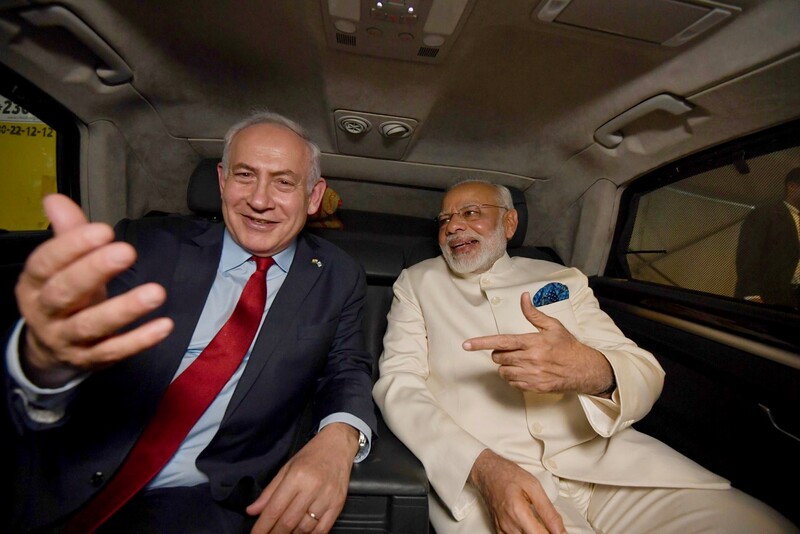India scraps “flagship” missile deal with Israel
Rights and Accountability 22 November 2017

Israeli Prime Minister Benjamin Netanyahu welcomed his Indian counterpart on an “historic” visit in July, but despite the fanfare major arms deals did not materialize as expected. (via Facebook)
Palestinians are welcoming India’s decision to scrap a $500-million deal to buy anti-tank missiles from the Israeli weapons firm Rafael.
Jamal Juma’, coordinator of the Palestinian Stop the Wall Campaign, called the move “a huge blow to the Israeli weapons industry.”
“It is also a major setback for Israel’s propaganda hubris that its technology is indispensable for India’s development and modernization,” Juma’, also affiliated with the Palestinian Boycott Divestment and Sanctions National Committee (BNC), added. “As many Indians are recognizing, Israel is marketing military and agricultural technologies in India and trying to cement Indian dependence on Israel.”
Signs of trouble
Israeli media had hailed the planned weapons purchase “as a flagship deal that cemented the budding Israeli-Indian security relationship.”
It appeared to be on course as recently as August when Rafael and India’s Kalyani Group announced a joint venture to open a factory in the southern Indian city of Hyderabad to make the missiles.
On Monday, before it was confirmed by Indian sources, Israeli media expressed consternation at the nixing of a deal that had been years in the works.
Ishai David, a spokesperson for Rafael, told The Jerusalem Post his company had not been informed of any decision by India not to buy the missiles. “This activity will continue as planned,” he insisted.
In retrospect, there were already signs of trouble in July when Hindu nationalist Narendra Modi became the first Indian prime minister to visit Israel.
Though Israel hailed the visit as an historic warming of ties, contrary to expectations no arms deals were signed including the Rafael deal.
What appears to have torpedoed the agreement was the Indian defense ministry’s insistence – overruling other agencies – that the country could develop its own technology and did not need Israel’s.
Israel as India’s model
While hailing the cancellation, Palestinians note that India remains one of Israel’s biggest arms customersand the two countries have other military joint ventures in the works.
As the BNC said, “over the last two decades, Indo-Israeli military relations have continuously increased despite various corruption scandals and technical failures.”
India has also turned to Israel as a model for its brutal repression of resistance to its rule in Kashmir.
Indian government efforts to manipulate the demographics of Kashmir by moving Hindus into the state have even been described as “an Israel-style policy of creating settlements in occupied territory.”
India’s ascendant Hindu nationalist right has also embraced Zionism and made common cause with Israel, an affinity further cemented by shared, virulent Islamophobia.
Far-reaching negative effects
A big part of Modi’s nationalism is his “Make in India” campaign to promote homegrown industry, and that also seems to have hurt the Rafael deal in spite of ideological affinities with Israel.
Scrapping the Rafael purchase could have far-reaching negative effects on economic relations, according to David Keynan, vice-chair of the Federation of Indo-Israeli Chambers of Commerce.
“It is a very noteworthy deal. It will have an impact not only on defense trade, but on all trade,” Keynan told The Times of Israel.
According to Keynan, weapons sales are often a “catalyst” for further trade.
“We hope this is the beginning of the end of Indian complicity in Israel’s egregious violation of international law and Palestinian human rights,” Omar Barghouti, a founder of the boycott, divestment and sanctions (BDS) movement for Palestinian rights, stated.
But Barghouti warned that as the BDS movement scores more successes in Europe and North America, “Israel has started dragging India into deals fraught with legal and political risks.”
Several Indian firms are bidding for drilling rights in Mediterranean waters claimed by Israel.
And earlier this year, India’s Adventz Group bid for work on Israel’s light rail system which connects settlements in the occupied West Bank in violation of international law.
Solidarity and discontent
There are also signs of discontent with the relationship. Last week lawmakers in India’s Telangana state denounced the state government’s plan to send 1,000 public officials on “training” junkets to Israel, wasting public money that could be used to improve the conditions of local farmers.
Hyderabad, where the Rafael missile factory was to be located, is Telangana’s state capital.
And in October, the All India Kisan Sabha, the largest national organization representing farmers and agricultural workers in India, announced its support for the BDS movement.
Barghouti said: “As Palestinians we ask the Indian people to maintain their proud legacy of commitment to independence, to growing local knowledge and to respecting other people’s struggles for freedom from colonialism and apartheid.”




Geen opmerkingen:
Een reactie posten